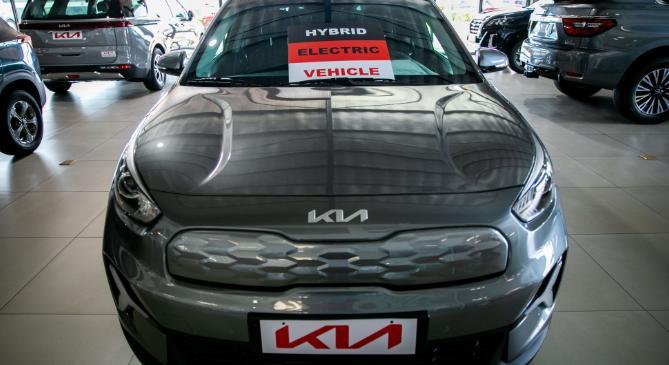Africa-Press – Rwanda. Rwanda’s shift from fuel-based transport to electric mobility is gaining speed, backed by government policies, growing investor confidence and an ecosystem of innovators.
From only 19 electric vehicles (EVs) in 2020, the number has surged to 512 fully electric cars and 6,660 hybrids registered by 2024, according to the Rwanda Revenue Authority (RRA).
The growth signals a coordinated push by government, private companies, and financial institutions to build an ecosystem that supports a cleaner, more affordable transport sector.
At the forefront are innovators like Ampersand and Spiro, which together operate more than 5,200 electric motorbikes nationwide. Ampersand alone has established 32 battery swap stations in Kigali and plans to produce up to 18,000 batteries locally.
According to the company, taxi riders using its e-motorbikes have increased their take-home pay by about 45 percent compared to what they earned when they used petrol-powered bikes. This, the company said, could translate into an average of $840 annually in fuel and maintenance costs per motorcycle.
“The transformation is real. Electric mobility is not just an environmental choice but also an economic one,” Teddy Mugabo, Chief Executive Officer of the Rwanda Green Fund (FONERWA), recently told Members of Parliament.
Since its inception in 2012, the FONERWA has mobilized over Rwf512.9 billion, financing more than 117 projects that promote social impact, job creation, and carbon reduction.
“This year, we have placed special focus on e-mobility, especially electric buses and charging stations, and are partnering closely with the private sector to expand this portfolio,” Mugabo said.
Through the Ireme Invest, a partnership with the Development Bank of Rwanda (BRD), the fund is offering catalytic financing, including grants of up to Rwf144 million and recoverable grants of up to Rwf400 million to help innovators.
Commercial banks, too, are joining the green transition. Equity Bank Rwanda Managing Director Hannington Namara said the bank has designed tailored credit products for EV buyers and green entrepreneurs.
“We provide loans for purchasing EVs at interest rates between 14 and 16 percent as part of our commitment to environmental protection,” Namara told The New Times. “We’re partnering with an investor planning to import over 1,000 electric vehicles; the first 30 are already on the way.”
At Bank of Kigali, plans are also underway to roll out a financing product for electric mobility.
“We are working on a new product to meet the growing demand from our clients,” said Daniella Umutoni Nyamwasa, the bank’s communications officer. “Once approved, it will be launched before the end of the year.”
I&M Bank has confirmed ongoing partnerships with local dealerships to make EV ownership more accessible through affordable loans.
Automobile distributors are equally aligning their business strategies with Rwanda’s clean mobility agenda.
CFAO Mobility Rwanda, the official distributor of BYD cars, expanded its line of fully electric and plug-in hybrid models tailored to local conditions, including the BYD ATTO 3, Dolphin, Seagull, and Tang.
While CFAO does not yet assemble vehicles locally, Augustin Nkotanyi, the company’s Senior Sales Executive, said plans for local production remain a long-term goal.
“We’re exploring opportunities to support Rwanda’s industrialization goals, including potential local assembly aligned with government priorities and market readiness,” Nkotanyi said.
CFAO offers after-sales services with battery warranties of up to eight years and collaborates with banks to simplify financing.
Meanwhile, Geely’s local dealer, Issa Nzeyimana, said his company connects Rwanda’s mobility needs with China’s advanced new energy vehicle industry.
“We link China’s technology with Rwanda’s clean transport ambitions,” Nzeyimana explained. “Through partnerships with banks like Equity, BK, and I&M, we’re helping customers acquire EVs via flexible payment plans.”
The government’s commitment is anchored in the 202-2034 Industrial Policy, which identifies electric vehicles as a strategic growth sector.
“We have investors already assembling motorcycles locally,” said Fred Mugabe, Industrial Development Policy Specialist at MINICOM.
“Our focus is to build an entire value chain that supports EV manufacturing, green jobs, and industrial growth.”
According to the Rwanda Energy Group (REG), industrial consumers of electricity, including e-mobility operators, currently enjoy subsidized tariffs of around $0.10 per kilowatt-hour, keeping operational costs low.
The government’s goal to electrify 20 percent of the bus fleet by 2030 will require significant investment in charging infrastructure and clear financing frameworks.
One flagship project is the planned transformation of the Nyabugogo multimodal transit hub, which will feature 18 high-power chargers, an 800-kWh solar PV system, and 470 kWh battery storage, a $7.7 million investment. Similar hubs are planned for Remera, Kimironko, Nyanza, Kabuga, and Kigali CBD.
While fully electric vehicles remain VAT-exempt, the government has reinstated an 18 percent VAT on hybrids, citing their limited contribution to emissions reduction due to aging imports.
Under its updated Nationally Determined Contributions (NDCs), Rwanda aims to cut greenhouse gas emissions by 53 percent by 2035, equivalent to 14.86 million tonnes, requiring an estimated $12 billion investment over the next decade.
Experts argue that success will depend on scaling renewable energy, improving efficiency, and accelerating clean transport adoption, with electric mobility playing a central role.
As Rwanda strengthens its foothold in Africa’s green mobility movement, policymakers see the EV transition not just as a response to climate change but as a foundation for a more innovative, industrial, and inclusive economy.
“Our goal is not just to adopt electric mobility,” said MINICOM’s Mugabe, “it’s to build an entire value chain that powers green industry, creates jobs, and drives Rwanda toward a cleaner, more resilient future.”
For More News And Analysis About Rwanda Follow Africa-Press






